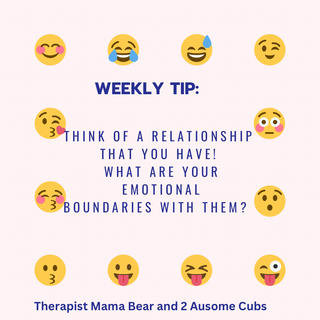Let’s talk about emotional boundaries
- Dr. Chisato
- Mar 6, 2023
- 2 min read
Updated: Mar 6, 2023
Reminder: Some of this information is from https://www.therapistaid.com/worksheets/boundaries-psychoeducation-printout!
Continuing on with our boundary series!!
The next one is emotional boundaries. So, what in the world is an emotional boundary ? It may not surprise you that... Emotional boundaries refer to a person's feelings.
Healthy emotional boundaries include limitations on when to share, and when not to share, personal information. For example, gradually sharing personal information during the development of a relationship, as opposed to revealing everything to everyone. It may not be appropriate, for example, to sit at a bus stop for 5 minutes and saying "hi! My name is ___. My greatest trauma is..." but it may be appropriate if we are in a therapy office.
Emotional boundaries are violated when someone criticizes, belittles, or invalidates another person's feelings.
For example, when parents (or friends, or anyone) says something like, "you are crying about that? That's so dumb," that would be a violation. We have the right to our feelings
Let's relate back to the closeness of boundaries to this!
What would a porous emotional boundary look like?
What would a rigid emotional boundary look like? What would a healthy emotional boundary look like?
For example, a porous emotional boundary may be going up and down in our emotions with that other person. "I'm happy if you are happy. I'm sad if you are sad." Of course, to a degree this may be healthy. And, at the same time, if it is excessive, it may be hard for us to know how we truly feel!
A rigid emlrional boundary may be completely shut off from others feelings. "Why would I be sad? That didn't happen to me," is something that I have heard from someone who was a part of a couple- and her wife's frustration was that she was "emotionally cut off."
Remember!
What is healthy, rigid or porous in our emotional boundaries (or any type!) depends on your comfort level, the relationship you have with that person, etc. what is healthy for your relationship with your significant other is different from your supervisor at work.
Until next time, for now, let's jump into this week's Therapist Mama Bear tip!
Extra tip: once you think of your emofional boundaries with them, are they porous, rigid or healthy? If they are rigid or porous, what can you do to move them to the opposite side a bit to make them a little healthier?






Comments